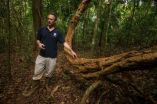(Press-News.org) Oncologists now have a new understanding of the toxicity levels of specific chemotherapy regimens used for women with early stage breast cancer, according to research from The University of Texas MD Anderson Cancer Center.
The retrospective study, published in the Journal of Clinical Oncology, used large population-based data to compare the risk of hospitalization for six common chemotherapy regimens. Reasons for hospitalization included infection, fever, anemia, dehydration, neutropenia (low white blood cell count), thrombocytopenia (low blood platelets) and delirium.
"The novelty of our study is that we were able to identify and delineate between different chemotherapy regimens in early-stage breast cancer using claims data, considered as real-world and non-clinical trial information," said Carlos Barcenas, M.D., assistant professor, Breast Medical Oncology and corresponding author.
There have been several prior publications in the health services research field addressing chemotherapy toxicity using claims data, but they don't outline specific chemotherapy regimens, Barcenas explained.
"The difficulty in the methodology is that most of these regimens are composed of several agents and have specific cycling times. The chemotherapy regimens have usually been referred to as "anthracycline" or "taxane-based," Barcenas said. "By characterizing subsets of patients at greatest risk for developing toxicities and adverse side-effects, clinicians may be able to select more tolerable treatments."
Researchers combined data from the Surveillance, Epidemiology and End Results (SEER) registry, compiled by the National Cancer Institute, and the Texas Cancer Registry to identify 3,567 patients ages 65 and older being treated for early stage breast cancer between 2003 and 2007. Additional data from Marketscan, a nation-wide employment claims database, identified 9,327 patients younger than 65 years of age with early stage disease.
Patients were then categorized into groups according to the chemotherapy regimens they received including:
Docetaxel and cyclophosphamide cycled every three weeks (TC)
Doxorubicin and cyclophosphamide cycled every three weeks (AC)
Docetaxel, doxorubicin and cyclophosphamide cycled every three weeks (TAC)
Doxorubicin and cyclophosphamide cycled every three weeks, followed or preceded by docetaxel cycled every three weeks (AC+T)
Doxorubicin and cyclophosphamide cycled every two weeks, followed or preceded by paclitaxel cycled every two weeks (ddAC+P)
Doxorubicin and cyclophosphamide cycled every three weeks followed or preceded by weekly paclitaxel (AC+wP)
Among patients younger than 65 years of age, the hospitalization rates ranged from 6.2 percent (ddAC+P) to 10 percent (TAC). In patients older than 65, rates ranged from 12.7 percent (TC) to 24.2 percent (TAC).
"Our findings demonstrate that TAC and AC+T were associated with the highest risk of hospitalization in patients younger than age 65," Barcenas said. "And for older patients all regimens, aside from ddAC+P, were associated with a higher risk of hospitalization compared to the regimen TC."
Barcenas notes these findings need to be taken with the consideration of potential biases where less aggressive regimens may have been offered to patients who are frailer.
Additionally, Barcenas said that findings showed that the use of the regimen TC has significantly increased over time, without any current evidence from clinical trials that this regimen is non-inferior to antracycline and taxane-based chemotherapy regimens.
The authors note several limitations exist with retrospective claims data research, including the inability to adjust for other clinical factors such as co-morbidities and therapy responses. Also, hospitalization data often underrepresents chemotherapy toxicities as mild events are usually managed in the outpatient setting.
Additional research is necessary to validate the study methodology. The most important question is which of these treatments is most effective for patients. It is likely that many of these regimens are similar in effectiveness and this study will help guide treatment by allowing physicians to pick the least toxic therapies, Barcenas said.
INFORMATION:
This work was supported in part by the Center for Comparative Effectiveness Research on Cancer in Texas, a multi-university consortium funded by the Cancer Prevention and Research Institute of Texas, the National Institutes of Health through MD Anderson's Cancer Center Support Grant (2P30 CA016672), the Dickson Fund for Breast Cancer Research and the Duncan Family Institute.
There are no conflicts to disclose.
Other authors on the all MD Anderson study include: Sharon Giordano, M.D., Jiangong Niu, Ning Zhang, Yufeng Zhang, Linda Elting, Ph.D., of Health Services Research; Gabriel Hortobagyi, M.D., Breast Medical Oncology; and Thomas Buchholz, M.D. and Benjamin Smith, M.D., of Radiation Oncology.
Study identifies risk of chemotherapy related hospitalization for eary-stage breast cancer patients
2014-05-27
ELSE PRESS RELEASES FROM THIS DATE:
Quantity, not quality: Risk of sudden cardiac death tied to protein overproduction
2014-05-27
A genetic variant linked to sudden cardiac death leads to protein overproduction in heart cells, Johns Hopkins scientists report. Unlike many known disease-linked variants, this one lies not in a gene but in so-called noncoding DNA, a growing focus of disease research. The discovery, reported in the June 5 issue of The American Journal of Human Genetics, also adds to scientific understanding of the causes of sudden cardiac death and of possible ways to prevent it, the researchers say.
"Traditionally, geneticists have studied gene variants that cause disease by producing ...
FDA approves many drugs that predictably increase heart and stroke risk
2014-05-27
The agency charged to protect patients from dangerous drug side effects needs to be far more vigilant when it comes to medications that affect blood pressure.
Robert P. Blankfield, MD, MS, a clinical professor of family medicine, issues this call to the U.S. Food and Drug Administration (FDA) in an editorial published recently in an online edition of the Journal of Cardiovascular Pharmacology and Therapeutics; the print version of the article is expected to appear this autumn.
The editorial notes that several medications survived FDA scrutiny, only to be pulled from ...
JCI online ahead of print table of contents for May 27, 2014
2014-05-27
Disturbed blood flow induces epigenetic alterations to promote atherosclerosis
Arterial hardening, also known as atherosclerosis, is the result of plaque buildup in the walls of arteries and over time can lead to cardiovascular complications, including heart attack, stroke, and peripheral vascular disease. Atherosclerotic plaques typically develop in arterial regions with disrupted blood flow. While blood flow disturbances are known to alter endothelial gene expression and function, it is not clear how altered blood flow induces these changes in endothelial cells. In ...
Study finds climate change accelerates hybridization between native, invasive trout
2014-05-27
MISSOULA – A new article by researchers from the University of Montana, the U.S. Geological Survey and Montana Fish, Wildlife & Parks asserts that climate warming is increasing the hybridization of trout – interbreeding between native and non-native species – in the interior western United States.
Clint Muhlfeld, a research assistant professor in the UM Division of Biological Sciences' Flathead Lake Biological Station and research ecologist with the USGS Northern Rocky Mountain Science Center in Glacier National Park, is the lead author of the article, titled "Invasive ...
Spontaneous thoughts are perceived to reveal meaningful self-insight
2014-05-27
PITTSBURGH—Spontaneous thoughts, intuitions, dreams and quick impressions. We all have these seemingly random thoughts popping into our minds on a daily basis. The question is what do we make of these unplanned, spur-of-the-moment thoughts? Do we view them as coincidental wanderings of a restless mind, or as revealing meaningful insight into ourselves?
A research team from Carnegie Mellon University and Harvard Business School set out to determine how people perceive their own spontaneous thoughts and if those thoughts or intuitions have any influence over judgment. ...
A habitable environment on Martian volcano?
2014-05-27
PROVIDENCE, R.I. [Brown University] — The slopes of a giant Martian volcano, once covered in glacial ice, may have been home to one of the most recent habitable environments yet found on the Red Planet, according to new research led by Brown University geologists.
Nearly twice as tall as Mount Everest, Arsia Mons is the third tallest volcano on Mars and one of the largest mountains in the solar system. This new analysis of the landforms surrounding Arsia Mons shows that eruptions along the volcano's northwest flank happened at the same time that a glacier covered the ...
Learning early in life may help keep brain cells alive
2014-05-27
Using your brain – particularly during adolescence – may help brain cells survive and could impact how it functions after puberty.
According to a recently published study in Frontiers in Neuroscience, Rutgers University behavioral neuroscientist Tracey Shors, who co-authored the study, found that the newborn brain cells in young rats that were successful at learning survived while the same brain cells in animals that didn't master the task died quickly.
"In those that didn't learn, three weeks after the new brain cells were made, one-half of them were no longer there," ...
Vanderbilt study finds women referred for bladder cancer less often than men
2014-05-27
Women with blood in their urine (hematuria) were less than half as likely as men with the same issue to be referred to a urologist for further tests, according to a new Vanderbilt University study.
The findings may help explain why women with bladder cancer are often diagnosed at a later stage in the disease and have worse mortality than men.
The study, presented by Jeffrey Bassett, M.D., MPH, fellow in Urologic Oncology, and Principal Investigator Daniel Barocas, M.D., MPH, assistant professor of Urologic Surgery, was shared during the American Urological Association ...
Addressing the physician shortage: Recommendations for medical education reform
2014-05-27
Since it started more than 30 years ago, funding the graduate medical education (GME) system has not evolved even as there has been a revolution in GME. The United States contributes almost $10 billion a year from Medicare into funding the GME system. However this system fails to provide the workforce needed for the 21st century and lacks the necessary transparency and accountability.
With an aging population and millions of people newly registered for health insurance because of the Affordable Care Act, there is a pressing need to increase the number of primary care ...
Vines choke a forest's ability to capture carbon, Smithsonian scientists report
2014-05-27
Tropical forests are a sometimes-underappreciated asset in the battle against climate change. They cover seven percent of land surface yet hold more than 30 percent of Earth's terrestrial carbon. As abandoned agricultural land in the tropics is taken over by forests, scientists expect these new forests to mop up industrial quantities of atmospheric carbon. New research by Smithsonian scientists shows increasingly abundant vines could hamper this potential and may even cause tropical forests to lose carbon.
In the first study to experimentally demonstrate that competition ...



